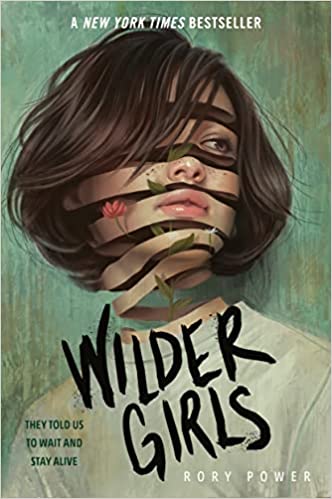Wilder Girls by Rory Power
It seems like every time an important work of pop culture enters the public consciousness, comparisons are drawn to a lesser-known work that the new one may or may not have plagiarized. It’s happened with the Harry Potter franchise (The Adventures of Willy the Wizard) and with Disney’s Lion King (Kimba the White Lion).
In recent memory, Suzanne Collins’ Hunger Games series drew controversy over its similarity to the 1999 Japanese novel Battle Royale and its 2000 film adaptation. The debate over the two works’ commonalities has come and gone, but the “battle royale” genre involving large groups of civilians facing off in fights to the death has seen a resurgence thanks to The Hunger Games and online video games such as “Fortnite.”
And so Rory Power’s explosive debut Wilder Girls (Delacorte Press) seemingly owes its success to its forebears, yet reading the YA novel it becomes immediately apparent that the work is wholly original. For starters, Wilder Girls ditches the dystopian “kids forced to fight by the adults that should know better” trope and pits its characters, students on an island, against one another for the sheer sake of survival. In fact, although it cheekily adopts (and subsequently transforms) the “battle royale” genre, the only thing it really has in common with previous works in that genre is an island and in-fighting.
The catalyst for all this in-fighting? A disease referred to as the Tox, which slowly spreads to the island’s inhabitants, its students and teachers alike. The Tox doesn’t discriminate; anybody exposed can lose the use of their eye, their arm or some other appendage.
Our protagonist Hetty sports one useless eye, but what she lacks in depth perception she makes up for in heart. In order to survive she’s forced to evaluate the relationships that she has: who to trust, who to protect, who to love.
This is an evolution of dystopian YA. At the start of the novel, the government is an ally rather than an enemy, dispatching the Navy to deliver supply packages full of amenities and necessities as opposed to Battle Royale’s weapon boxes and The Hunger Games’ sponsored care packages. However, this is also an early sign of the hands-off approach taken with the Raxter School girls, an approach that characterizes the relationship between adults and kids in this novel.
They’ve been quarantined on account of the Tox, and every day things get worse with no end in sight. In some ways the Tox works as an analogy for the growing pains of adolescence—a particularly visceral and macabre analogy as Power doesn’t hold back with the body horror. And why shouldn’t it be? Growing up is messy and gross and one of YA fiction’s greatest strengths is using that messiness and grossness to connect with readers. With Wilder Girls, Rory Power has established herself as an innovative new voice in the genre. Also, what with the Cronenberg-esque descriptions of Tox mutations, a pretty gross voice—in a good way.
Wilder Girls is now available.
Buy this Book!
Amazon




